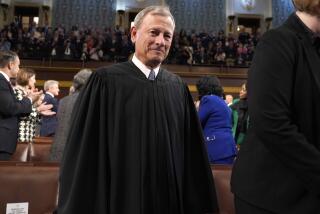Roberts to Be Quizzed on Torture
- Share via
WASHINGTON — The senator who will lead Democratic questioning of Supreme Court nominee John G. Roberts Jr. told Roberts on Monday that he intended to explore his views on the Bush administration’s policy on torture.
Sen. Patrick J. Leahy (D-Vt.), the top Democrat on the Judiciary Committee, met for more than an hour with Roberts and gave him a copy of a highly controversial 2002 memorandum written by Bush administration lawyers that provided legal arguments for when torture might be appropriate.
Leahy said that even though Roberts had nothing to do with the document, known as the “Bybee memo,” he would like Roberts to discuss the arguments in it and to ask him “in what areas, if any, is the president considered to be above the law.”
Leahy also complained about the continued absence of documents relating to Roberts and affirmative action that went missing from the Ronald Reagan Presidential Library after they were reviewed by Bush administration staff members.
An investigation by library officials has failed to find the memo Roberts wrote on the subject, along with supporting material.
“I don’t think anybody would have found that acceptable from the Clinton administration,” Leahy told reporters. “I don’t find it acceptable from the Bush administration.”
The Reagan library acknowledged the absence of the documents when it released a large tranche of Roberts-related papers Aug. 15 and started an investigation into the disappearance.
White House officials, asserting that Leahy had no grounds for complaint, provided a copy of an Aug. 15 statement from the archivist of the United States saying that the contents of the affirmative action file had been reconstructed from copies of the documents filed elsewhere.
But Leahy said the only evidence of what was in the file came from notes taken by a Bush administration official who perused it as part of a White House vetting process.
Under rules established in 2001 by an order from President Bush, the White House has the right to review all documents from previous administrations before they are released to Congress or the public.
Roberts’ Supreme Court nomination is the first since the president implemented the rules, and the result has been that all documents requested by Congress as part of Roberts’ confirmation process have had to undergo a review by administration officials.
In the 2002 Bybee memo, also dubbed the “torture memo” by some, then-Assistant Atty. Gen. Jay Bybee said torture consisted only of severe physical harm such as organ failure.
He argued that the president had the right to issue orders that violated U.S. and international laws against torture in some circumstances.
Bybee is now a judge on the U.S. 9th Circuit Court of Appeals in San Francisco. He was confirmed by the Senate shortly before his memo became public.
Although the White House claimed the U.S. government always sought to abide by the Geneva Convention and other laws that prohibit torture, critics alleged that the memo helped create a lax climate in the administration that led to abuses by U.S. military forces, such as those at Abu Ghraib prison in Iraq, that many considered incidents of torture.
Leahy said he wanted to discuss the limits of presidential power with Roberts, and provided him a copy of the memo so he would not be able to sidestep questions by saying he was unfamiliar with it.
“I don’t think a Supreme Court hearing is a game of ‘gotcha,’ ” Leahy said. “I’d really like to know what he thinks.”
Leahy said he discussed with Roberts the importance of an independent judiciary as well as views apparently held by Roberts that Leahy said he considered “extreme.”
The administration continued its release of documents Monday, providing three small batches to the Senate Judiciary Committee -- one from the National Archives, one from the Reagan library and a third from the George H.W. Bush library in College Station, Texas. All three totaled about 600 pages.
They included much material that had been previously released, such as memos Roberts wrote about various candidates for White House appointments, and personnel documents about Roberts collected by the administration of the first President Bush before he was nominated in 1992 to the U.S. Court of Appeals for the District of Columbia Circuit. That nomination was never acted on by the Democratic-controlled Senate Judiciary Committee.
*
Times staff writer David Savage contributed to this report.
More to Read
Get the L.A. Times Politics newsletter
Deeply reported insights into legislation, politics and policy from Sacramento, Washington and beyond. In your inbox twice per week.
You may occasionally receive promotional content from the Los Angeles Times.










